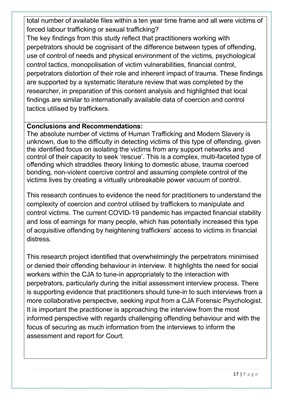
17 | P a g e
total number of available files within a ten year time frame and all were victims of
forced labour trafficking or sexual trafficking?
The key findings from this study reflect that practitioners working with
perpetrators should be cognisant of the difference between types of offending,
use of control of needs and physical environment of the victims, psychological
control tactics, monopolisation of victim vulnerabilities, financial control,
perpetrators distortion of their role and inherent impact of trauma. These findings
are supported by a systematic literature review that was completed by the
researcher, in preparation of this content analysis and highlighted that local
findings are similar to internationally available data of coercion and control
tactics utilised by traffickers.
Conclusions and Recommendations:
The absolute number of victims of Human Trafficking and Modern Slavery is
unknown, due to the difficulty in detecting victims of this type of offending, given
the identified focus on isolating the victims from any support networks and
control of their capacity to seek 'rescue'. This is a complex, multi-faceted type of
offending which straddles theory linking to domestic abuse, trauma coerced
bonding, non-violent coercive control and assuming complete control of the
victims lives by creating a virtually unbreakable power vacuum of control.
This research continues to evidence the need for practitioners to understand the
complexity of coercion and control utilised by traffickers to manipulate and
control victims. The current COVID-19 pandemic has impacted financial stability
and loss of earnings for many people, which has potentially increased this type
of acquisitive offending by heightening traffickers' access to victims in financial
distress.
This research project identified that overwhelmingly the perpetrators minimised
or denied their offending behaviour in interview. It highlights the need for social
workers within the CJA to tune-in appropriately to the interaction with
perpetrators, particularly during the initial assessment interview process. There
is supporting evidence that practitioners should tune-in to such interviews from a
more collaborative perspective, seeking input from a CJA Forensic Psychologist.
It is important the practitioner is approaching the interview from the most
informed perspective with regards challenging offending behaviour and with the
focus of securing as much information from the interviews to inform the
assessment and report for Court.